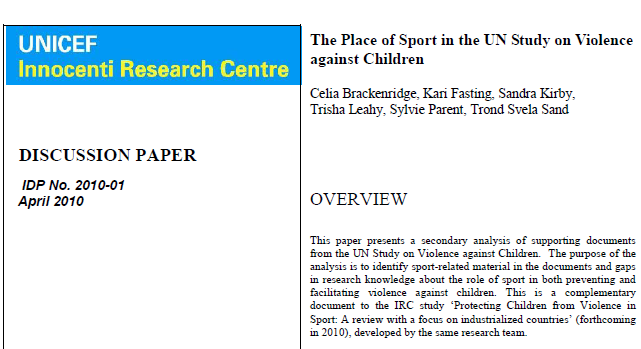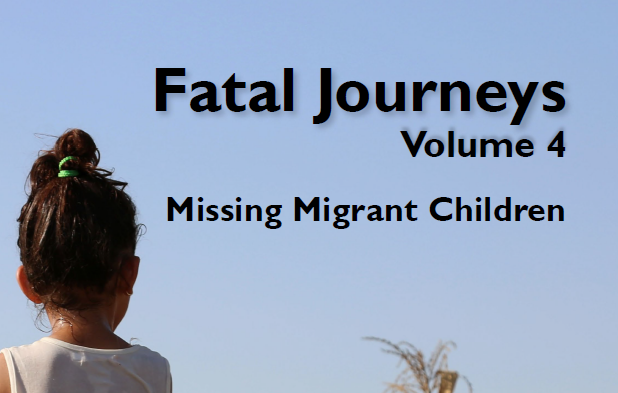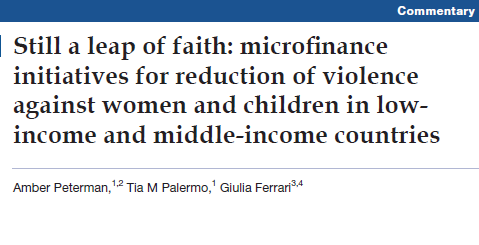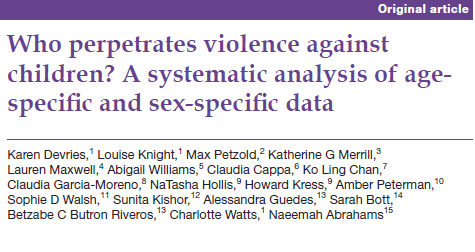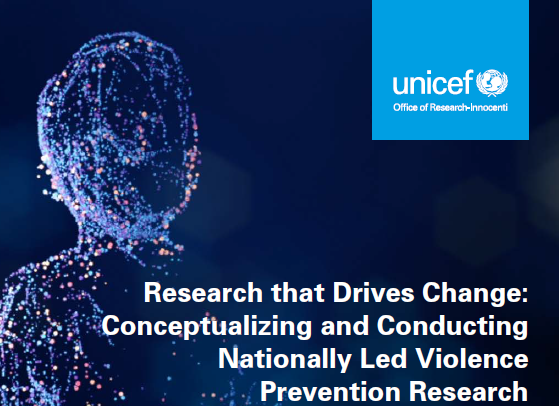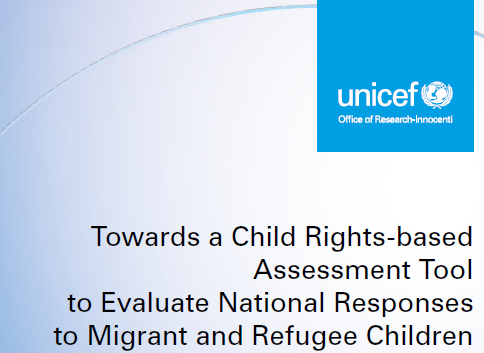For a quick search in the Knowledge database below, please use the search box. Also, note that using one or more of the dropdown filters will optimise your search.
Watch this video to find out more about our Knowledge Database and the publications we have collected here for you: video
Knowledge Database
-
The Place of Sport in the UN Study on Violence against Children
UNICEF | Published in 2010
This paper presents a secondary analysis of supporting documents from the UN Study on Violence against Children. The purpose of the analysis is to identify sport-related material in the documents and gaps in research knowledge about the role of sport in both preventing and facilitating violence against children. This is a complementary document to the IRC study „Protecting Children from Violence in Sport: A review with a focus on industrialized countries‟ (forthcoming in 2010), developed by the same research team.
Keywords: children, prevention, victimisation, violence -
Fatal Journeys: Missing migrant children. Volume 4
IOM | Published in 2019
This is the fourth in IOM’s series of annual global reports on the deaths and disappearances of migrants around the world. Since 2014, IOM’s Missing Migrants Project has recorded globally the deaths of more than 32,000 people. These figures are likely to be much lower than the real number of deaths, given that many bodies are never found or identified.
Keywords: children, migration, victimisation -
Still a leap of faith: microfinance initiatives for reduction of violence against women and children in low-income and middle-income countries
Peterman A, Palermo TM, Ferrari G. | Published in 2018
Economic strengthening interventions, including microfinance initiatives have been proposed as promising strategies to reduce interpersonal violence in low-income and middle-income settings. Despite these recommendations, there is little rigorous empirical evidence that microfinance alone or synergistically with gender norms or equity training can reduce violence against children or intimate partner violence. This paper calls for further investments in evidence generation around economic strengthening before scaling- up potentially ineffective interventions.
Keywords: children, gender based violence, gender inequality, prevention, support -
Who perpetrates violence against children? A systematic analysis of age-specific and sex-specific data
Devries K, Knight L, Petzold M, et al. | Published in 2017
The epidemiology of violence against children is likely to differ substantially by sex and age of the victim and the perpetrator. Thus far, investment in effective prevention strategies has been hindered by lack of clarity in the burden of childhood violence across these dimensions. This paper produced the first age-specific and sex-specific prevalence estimates by perpetrator type for physical, sexual and emotional violence against children globally.
Keywords: children, prevention, victimisation, violence -
Research that Drives Change: Conceptualizing and Conducting Nationally Led Violence Prevention Research
Globally, studies have demonstrated that children in every society are affected by physical, sexual and emotional violence. The drive to both quantify and qualify violence through data and research has been powerful: discourse among policy makers is shifting from “this does not happen here” to “what is driving this?” and “how can we address it?” To help answer these questions, the Multi- Country Study on the Drivers of Violence Affecting Children – conducted in Italy, Viet Nam, Peru and Zimbabwe – sought to disentangle the complex and often interrelated underlying causes of violence affecting children (VAC) in these four countries. Led by the UNICEF Office of Research – Innocenti with its academic partner, the University of Edinburgh, the Study was conducted by national research teams comprised of government, practitioners and academic researchers in each of the four countries. Drawing on human-centred principles, the Study used an iterative approach which put national ownership and co-creation at its core.
Keywords: children, prevention, violence -
Towards a Child Rights-based Assessment Tool to Evaluate National Responses to Migrant and Refugee Children
UNICEF | Published in 2018
The exponential rise in the number of children seeking asylum in Europe in 2015 clearly caught European child rights actors and agencies by surprise and exposed significant flaws in the national child protection systems of some of the world’s most advanced economies. One concrete outcome of this evolving discourse is the development of a multitude of guidance, guidelines and good practice models aimed at facilitating a child rights-based approach to the protection of migrant and refugee children. A literature review undertaken by the author in June 2017 covered almost 40 documents published since 2000 to offer guidance on various aspects of work with migrant and refugee children.
Keywords: children, migration -
Best of UNICEF Research
UNICEF | Published in 2018
The research pieces presented here examine questions about children’s lives that range from the positive effects of female teachers, the long-term disadvantage of experiencing a drought during childhood, the impact of growing up in the shadow of violence, and the challenges of addressing social norms around harmful practices. The projects demonstrate some imaginative use of quantitative, qualitative and mixed methods, innovative approaches including meteorological models (see Ethiopia) and blood tests (see Mali) and participatory methods of engaging with young people (see Thailand and Ethiopia). Above all, several projects illustrate the distinctive advantage of undertaking research within an organization with global programmatic and policy reach, in partnership with academic and policy institutions. Some projects start from the context or reality on the ground, responding to the immediate programming challenges of UNICEF staff and partners; initial research on such issues may go on to shape the research agendas of others and contribute to building a body of evidence on neglected issues. Other projects examine the breadth of academic work on a topic, synthesizing and translating findings in a way that informs better programming and drives change for children. Others depend on the access afforded by UNICEF’s programmatic presence to implement the research, or are undertaken in close collaboration with government partners that can lead to shaping policy and practice at scale.
Keywords: capacity building, children, gender inequality -
Getting it Right for Young Victims and Witnesses: What Children and Young People Say They Need from Support Services
You & Co | Published in 2015
There is significant evidence that demonstrates children and young people are not receiving the level of support and services that they are entitled to as victims of crime under the Victim’s Code. The need for children and young people to be supported by specialists who understand the unique ways children experience and are impacted by crime, and have the skills to communicate and work alongside them should not be under-estimated. This report is based on evidence gathered from Victim Support Young Victim and Young Witness services. It identifies individual young people’s experiences and the ways in which they felt they were helped and the times they also felt let down by criminal justice agencies. It also analyses how services can best be commissioned and work collaboratively together to ensure that young people are provided with appropriate support at every step of the criminal justice journey.
Keywords: children, support, victim services, victims' rights -
Guide to the EU Victims’ Directive: Advancing Access to Protection, Services, and Justice for Undocumented Migrants
PICUM | Published in 2015
The EU Victims’ Directive grants equal rights and protection to all victims of crime, and therefore provides an essential legislative framework for advancing undocumented migrants’ access to protection, services and justice. But those benefits will not come about without further action by member states and by civil society to create the awareness and the infrastructure needed to connect undocumented victims of crime with the services they are entitled to, as well as to the opportunities they have to participate in the criminal justice process.
Keywords: migration, support, victim services, victims' rights -
Survivor Insights: The Role of Technology in Domestic Minor Sex Trafficking
Thorn | Published in 2018
In an effort to strategically inform technology initiatives for combating domestic minor sex trafficking (DMST), Thorn partnered with Dr. Vanessa Bouché at Texas Christian University to survey survivors about their experiences. The survey focused on understanding what role technology played in a victim’s recruitment into, time while in, and exit from DMST (in the USA).
Keywords: children, human trafficking, sexual violence
